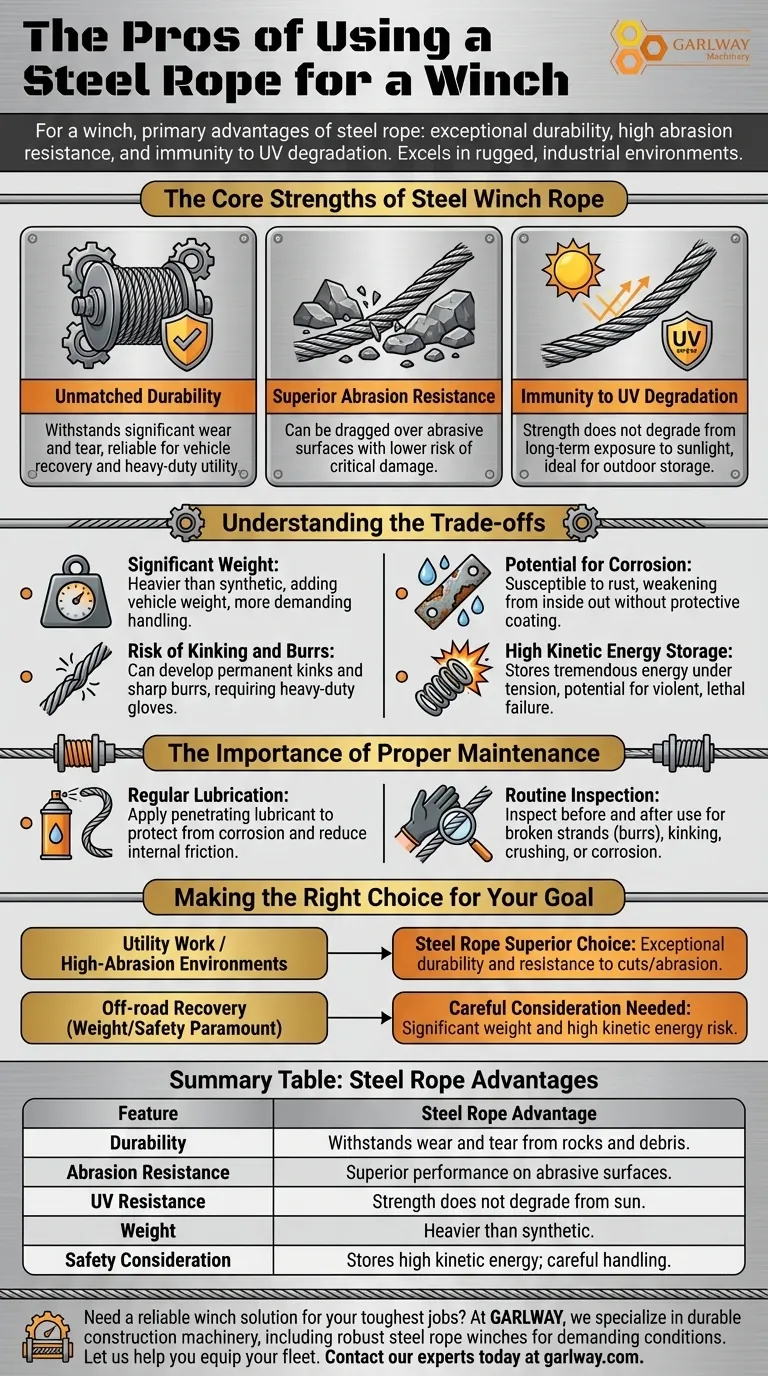For a winch, the primary advantages of a steel rope are its exceptional durability, high resistance to abrasion, and immunity to UV degradation. It excels in rugged, industrial environments where the rope is frequently dragged over abrasive surfaces like rocks, gravel, or job site debris.
While synthetic ropes have gained popularity, steel remains the definitive choice for applications demanding maximum durability and abrasion resistance. Understanding its specific strengths and weaknesses is key to using it safely and effectively.

The Core Strengths of Steel Winch Rope
Steel wire rope has been the traditional choice for winching for decades, and for good reason. Its inherent properties make it uniquely suited for specific, demanding tasks.
Unmatched Durability
Steel is fundamentally a tough material. It can withstand significant wear and tear, making it a reliable option for both vehicle recovery and heavy-duty utility work.
Superior Abrasion Resistance
This is arguably steel's greatest advantage. The rope can be dragged over sharp rocks, rough ground, and other abrasive surfaces with a much lower risk of critical damage compared to synthetic alternatives.
Immunity to UV Degradation
Unlike synthetic fibers, steel is completely unaffected by long-term exposure to sunlight. This makes it ideal for winches that are permanently mounted on vehicles or equipment stored outdoors, as its strength will not degrade from UV radiation.
Understanding the Trade-offs
The robustness of steel comes with significant trade-offs that directly impact safety and handling. Acknowledging these is critical for any operator.
Significant Weight
Steel rope is considerably heavier than synthetic rope of a similar strength. This adds weight to the vehicle and makes handling the line, especially for long pulls, more physically demanding.
Risk of Kinking and Burrs
If bent too sharply or improperly spooled, steel rope can develop permanent kinks that compromise its structural integrity. Over time, individual wire strands can break, creating sharp, dangerous burrs that can easily tear through skin and require the mandatory use of heavy-duty gloves.
Potential for Corrosion
As a ferrous metal, steel rope is susceptible to rust, especially if the protective coating is worn away. Corrosion weakens the rope from the inside out and can shorten its operational lifespan.
High Kinetic Energy Storage
When under extreme tension, a steel rope stores a tremendous amount of kinetic energy. If it fails, it will whip back with violent, potentially lethal force. This is a critical safety consideration that requires proper training and equipment like winch dampers.
The Importance of Proper Maintenance
To leverage the benefits of steel rope and mitigate its risks, a consistent maintenance routine is non-negotiable. This ensures both safety and longevity.
Regular Lubrication
Applying a penetrating wire rope lubricant is essential. This protects the individual strands from corrosion and reduces the internal friction that occurs as the rope stretches and contracts under load.
Routine Inspection
Before and after each use, the rope must be carefully inspected. You should run a gloved hand along its length to feel for any broken strands (burrs) and visually check for any signs of kinking, crushing, or corrosion.
Making the Right Choice for Your Goal
Selecting the right winch line is about matching the tool to the task.
- If your primary focus is utility work or high-abrasion environments: Steel rope's exceptional durability and resistance to cuts and abrasion make it the superior choice.
- If your primary focus is off-road recovery where weight and safety are paramount: The significant weight and risk associated with a snapping steel line mean its trade-offs must be carefully considered.
Ultimately, choosing steel rope is a commitment to its strength, balanced by a deep respect for its maintenance needs and safety protocols.
Summary Table:
| Feature | Steel Rope Advantage |
|---|---|
| Durability | Withstands significant wear and tear from rocks and debris. |
| Abrasion Resistance | Superior performance when dragged over abrasive surfaces. |
| UV Resistance | Strength does not degrade from sun exposure. |
| Weight | Heavier than synthetic, adding vehicle weight. |
| Safety Consideration | Stores high kinetic energy; requires careful handling. |
Need a reliable winch solution for your toughest jobs?
At GARLWAY, we specialize in durable construction machinery, including robust winches designed to handle the most demanding conditions. Our steel rope winches offer the exceptional abrasion resistance and long-term durability that construction companies and contractors rely on globally.
Let us help you equip your fleet with the right tool for the job. Contact our experts today to discuss your specific needs and find the perfect winch solution from our range of products, including concrete mixers and batching plants.
Visual Guide

Related Products
- Electric and Hydraulic Winch for Heavy Duty Applications
- Warn Winch Windlass Boat Trailer Winch
- Electric 120V Boat Winch by Badlands
- Best 18000 Pound Drum Anchor Trailer Winch
- 12000 lb Heavy Duty Electric Boat Winch
People Also Ask
- How is an electric winch powered? Unlock the Power Conversion System for Heavy Lifting
- How to power an electric winch on a trailer? Choose the Best Method for Your Setup
- How does the electric winch work? Unlock the Power of Force Multiplication
- How long can you run an electric winch? Master Safe, Efficient Vehicle Recovery
- How to maintain an electric winch? Ensure Peak Performance & Reliability for Your Projects



















